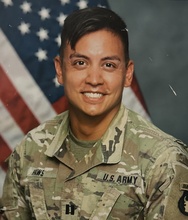
Daniel X. Haws had never been to the United States until he was a teenager, but he identified strongly with being American. Born in Belgium to American parents, Haws grew up living in and attending schools in various countries across Europe and Asia as his family moved often for his father’s job with Bobcat. His mother worked as his father’s translator.
“The biggest lesson I took from my upbringing is that American isn’t a color or a race,” he says. “Feeling American was important to me, and my dad was very adamant that I would go to an American university.”
His family moved to Pella, Iowa, when he was in high school, and he stayed in the state to complete a bachelor's degree in English literature at the University of Iowa.
“When people ask, ‘Where are you from?’ I often say, ‘The University of Iowa,’” Haws says. “That’s been my home.”
During his junior year at Iowa, Haws’ father died. His mother had already passed away when he was a child, so at age 20, Haws was now without parents.
“It really hit me hard,” Haws says.
The combination of his emotional struggle while grieving and financial changes in his family made it difficult for Haws to focus on school. His academic performance faltered, and he wasn’t sure how he would afford to continue his studies. He feared he would not be able to follow his dream of becoming a physician.
“I went to the Iowa National Guard,” Haws says. “I was so nervous I couldn’t even sit down. I thought I was going to be homeless because I couldn’t pay for school, and that’s where I was living. I didn’t have a job. But the two gentlemen that I talked to told me, ‘We’re going to get you through this.’”
With the support and encouragement of his officers, Haws graduated college, though his grades still reflected the difficult time he had been through.
“I had passed, but I felt I was not successful,” Haws says. “I was thinking, ‘How can I expect myself to take care of people, but I can’t even take care of myself?’”
He decided to put his medical school plans on pause and lean into his career with the National Guard. Over time, military service gave him renewed purpose. He has now served in the Iowa National Guard for 14 years, served as an Army Ranger, achieved the rank of captain, and served as a commanding officer for a company during deployment to the Middle East.
“My military career allowed me to do things that I would not have thought that I was capable of doing,” Haws says. “I didn’t value myself as highly as a person probably should, and the Army built that up for me.”
Haws decided it was time to return to his dream of going to medical school. He went back to school to raise his GPA and complete his prerequisites courses, earning a second bachelor’s degree in microbiology—but his first application to the University of Iowa Carver College of Medicine was unsuccessful.
Disappointed, but determined to follow his dream wherever it needed to take him, Haws began preparing to move out of the state to continue his education at another medical school, where he had been accepted. Then he was invited to a post-interview call with Kathi Muhlenbruck, director of MD admissions.
“I remember feeling really down on myself,” Haws says. “But then Kathi said, ‘You had a very interesting application.’”
Muhlenbruck talked Haws through how to improve his application for the next cycle and encouraged him to re-apply.
“My meeting with Kathi was so influential to me that I denied my acceptance to that school,” he says. “I did the entire application process all over again. I’m an Iowan, and I’d rather try again than go to a place I didn’t feel like I would be from."
He followed her advice and was accepted on his second try. This summer, he kicked off his medical education early by participating in Introduction to Medical Education at Iowa (IMEI), a program offered by the college to nontraditional students. The program features lectures, an anatomy lab, and even exams, all designed to give participants a taste of medical school life before their classes officially begin.
My military career allowed me to do things that I would not have thought that I was capable of doing. I didn’t value myself as highly as a person probably should, and the Army built that up for me.
“These six weeks have been so enjoyable,” Haws says. “It gives you this instant immersion into being a medical student. I’ve met such good friends, and it’s the most comforting feeling knowing that I'm going to start the semester already having people I can study with and knowing where the classrooms are. It has prepared me to be the best medical student I could be.”
As he reflects on his long road to medical school, Haws is grateful to have persevered through the difficulties to find himself at the Carver College of Medicine.
“I want to be a physician and to work with Iowans,” he says. “The most freeing and exciting thing for me is knowing that this world-class education I’m about to receive and all the things I get to participate in are built around the fact that I’m just meant to learn.”